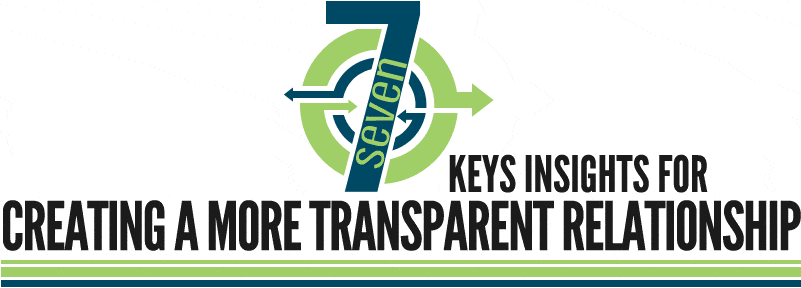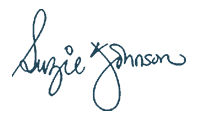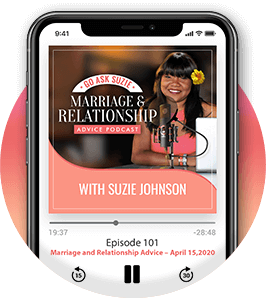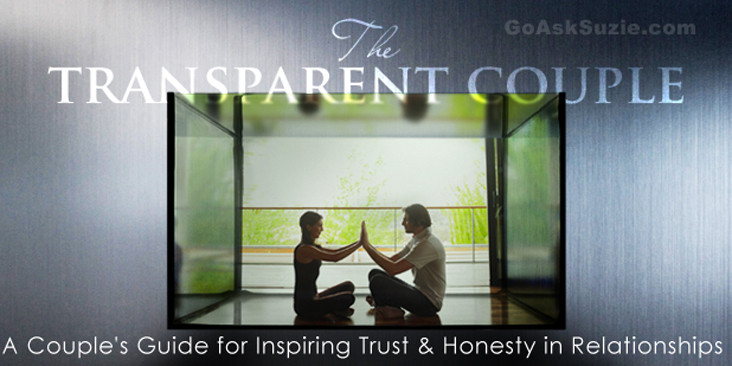A Couple's Guide for Inspiring Trust & Honesty in Relationships
Living transparently describes an open-book lifestyle. It’s the personal choice to allow your partner to see, know, and verify your intentions, emotions, actions and activities.
The opposite of living transparently can be described as living secretively… which means you’re guarded about your emotions, covert about your actions, and your intentions are revealed on a need-to-know basis.
Who is the transparent couple?
The transparent couple has made a commitment to living openly and honestly with each other. They have agreed to give each other unrestricted access to their inner and outer worlds. If this is your first introduction to the concept of living transparently, it might be helpful for you if I begin by talking about what transparency is not.
What transparency is not:
- Compliance — Transparency can’t be forced, but it can be inspired. If you try to force your partner to be transparent, you’ll end up with some form of temporary compliance instead of true transparency.
- Passive — There’s no such thing as passive transparency. Real transparency requires active participation, active demonstrations, and honest disclosure by both partners.
- Control — Transparency isn’t a form of control. Because it’s totally voluntary, when partners choose to live transparently, they must first feel it’s safe enough to do so.
How do you inspire transparency?
As you can imagine, living transparently isn’t right for every couple, and it won’t work in every relationship. However, I’ll go out on a limb and say… it’s absolutely worth giving it a try.
To help you do that, here are seven key insights you can use to help you begin the process of becoming a more transparent couple.
Let’s look at those 7 key insights next…


Honesty Is the Doorway to Transparency
What is honesty?
Webster defines honesty this way: “fairness and straightforwardness of conduct and adherence to fact.” Other dictionaries define honesty as “speaking truth in all varieties of communication, both verbal and non-verbal, being without deception.” But this is the definition I have found the most useful: “honesty means consistent loyalty to truth.”
Here’s the reason I’ve found this definition so useful: loyalty means faithfulness without question.
In other words…
What you are loyal to… you follow without question.
The word “loyalty” is important here, because it’s the act of binding yourself (intellectually or emotionally) to a course of action. So when you’re loyal to truth, it suggests there is no conflict of interest within your own mind. Your loyalty is to truth, and that is without question.
Why does loyalty to truth = honesty?
When it comes to communicating our intentions and motives, things can get pretty complicated. But the fact remains that every choice, every action, and every word that comes out of our mouth bears witness to what values we are loyal to.
You can easily verify this yourself, to see if this is true for you.
Observe for a day other people’s conversations, and you’ll soon have clues about what values they are secretly loyal to. The way they communicate lets you know if they’re loyal to being right, loyal to winning, loyal to fitting in, or loyal to making a good impression.
Honest people are loyal to truth above all other values. This means they don’t lie to avoid hurting feelings, they don’t misrepresent to make a favorable impression, and they won’t manipulate or use deceptive tactics to gain unfair advantages.
So how loyal to the truth are you really?
Your loyalty to truth can be measured in your consistency. The word “consistent” is important here because the more consistently loyal to truth you are, the more of an honest person you are.
Notice, I said consistently loyal (not perfectly loyal). That’s because honesty isn’t about perfection; it’s about consistency. The opposite is also true. Inconsistency suggests a willingness to abandon truth because it might help you gain benefits or avoid negative consequences.
The more inconsistent you are in your loyalty to truth, the more dishonest you become.
But why is honesty (loyalty to truth) so important when it comes to inspiring transparency? It all comes down to one word: Trust. Those who are loyal to truth inspire trust. And that trust is what makes it safe for others to be transparent with you.

There's No Real Intimacy Without Transparency
Just as there can be no trust without honesty, there’s no real intimacy without transparency. And what is a loving relationship without intimacy or trust? That’s right, not much.
Here’s what I mean:
Intimacy (IN-TO-ME-SEE) is all about the willingness to grant your partner total access to your inner world. Your inner world is the hidden world of your secrets, fantasies, motives, intentions, desires, and beliefs. It’s who you are without the masks and without the pretenses.
Achieving this state of intimacy requires you to be mentally and emotionally transparent. This is why there’s no real intimacy without transparency.

Dysfunction Is Created by Dishonest Actions
What is dishonesty?
Well, it goes without saying that dishonesty is the opposite of honesty. However, that definition is so simple that many fail to understand the full range of dishonesty. Because not only is dishonesty the absence of honesty, it’s also the denial of truth and the defaulting on your responsibility to be honest.
The truth about dishonesty:
- Dishonesty includes excuses and rational lies used to default on meeting our responsibilities.
- Being in denial means being dishonest with yourself about a truth or fact.
- Wishing things were different is a form of denial (dishonesty) because the reality is that, things are the way they are (truth).
- Dishonesty is misrepresenting our true feelings to avoid hurting others.
If dishonesty were ice cream, it would be available in two flavors: emotional dishonesty and verbal dishonesty.
Examples of verbal dishonesty:
- Lying (including little white lies)
- Exaggerations (overstating the truth)
- Misdirection (omission, manipulation, and withholding)
- Excuses (indirectness, vagueness, and avoidance)
- Pretense (faking it)
Examples of emotional dishonesty:
- Denial (pretending to want what you don’t want, hiding what you do want)
- Projection (attacking, accusing, blaming, and condemning to cover your own fears and anger)
- Misrepresenting intentions, motives, desires, and emotions
- Rationalizations and excuses (using the intellect to buffer against facing consequences)
The thing to note is that any form of dishonesty leads to dysfunction in a relationship. And a dysfunctional relationship is just not healthy enough (or safe enough) for transparency to flourish. So if you want to inspire transparency, begin by eliminating all types of dysfunctional habits — especially dishonesty.

Make It Safe for Your Partner to Be Honest With You
“Can I trust you not to get your feelings hurt? If I can, then it means it’s safe for me to be honest with you.”
Alas, many of us say we want our partners to be totally honest, but we mean it only so long as they say the things we want to hear. The moment they don’t, we get upset and punish them. But if you want to hear the truth, you must be able to handle the truth.
Making it safe for your partner to be honest with you begins by removing the following three culprits:
- Remove the fear of hurting each other’s feelings. This is a classic excuse for relationship dishonesty. In an attempt to avoid hurt feelings, couples tell each other what they want to hear rather than being honest about how they feel. The way to remove this culprit is for both partners to take responsibility for their own feelings.
- Remove the fear of punishment. Adults are deceptive for the same reason children are deceptive: because they fear the truth will get them into trouble. One way to remove this culprit is to reward truth rather than punish lies. This is far more effective because people are more likely to do what brings rewards.
- Remove the inhibitions and perceived lack of safety. The reality is that people will only be as honest as they feel safe to be. If you’re the type of partner who’s quick to judge, easily offended, or highly sensitive, then your partner might feel inhibited in being honest. If this is the case, then you’ve got to make it safe for others to tell you the truth before you can expect them to do so.

What You Hide, You Keep
Well, think about it. The parts of ourselves we hide are the parts we don’t like (the parts that we feel ashamed of or are guilty about) and that’s why we lock them away in the basement of our lives. But just because we hide something doesn’t mean it’s gone. Living transparently means airing out the closets and sweeping out the cobwebs from under the bed. It means to come out of hiding… to walk in the light… to learn how to be OK with your flaws, faults, and shortcomings.
And when you do this…
It allows you to have compassion for others. This is the key to it all because the goal of living transparently is to learn how to live honestly. Once you’re truly being honest, then you honestly have to admit that you’re not the exception, but the example of what it means to be human.
This is both a humbling and an exhilarating thought…
Because it means you belong to the same group as Mother Teresa, Nelson Mandela, and the Dalai Lama. As you think about this, it suddenly becomes clear that none of them could have accomplished what they did by hiding themselves.

People with Nothing to Hide… Hide Nothing
By its very definition, transparency includes the option for others to verify the content of your actions, activities, and intentions. Well, here’s the good news about knowing you are accountable to someone else. It strengthens your ability to be accountable to yourself.
Let me give you an example.
I facilitated a couple through the process of rebuilding trust in their marriage after the husband had an emotional affair with a woman he met in an erotic chat room. It turns out that porn was a big problem for him. He admitted it was going to be extremely difficult for him to get past his strong urges to look at porn on the Internet. Yet, he wanted to learn how to live transparently, so I suggested he check out a certain software-tracking program that would act like an accountability system and send an alert email to his wife anytime he surfed an adult content website.
At first, he was very nervous about it.
But I told him, “The goal is transparency, not control. This means if you surf porn, then be transparent about it. Let her into your inner world. I’m not saying don’t surf porn. I’m saying if you surf porn, be honest about it.”
Guess what happened?
A few months later, he told me that just the idea that his wife could know what he was looking at, at the very time he was looking at it, made him cringe. As a result, he doesn’t surf porn. Without that distraction, he noticed his productivity in other areas went through the roof. That’s the power of accountability. And that’s the power of living transparently. It allows you to bring what is hidden into the light.
Now, maybe you’re wondering…
What about privacy?
There’s a difference between privacy and living transparently. Transparency is all about not hiding. This means not keeping secrets, not doing things in the dark that you wouldn’t do in the light, and not saying things behind your partner’s back that you wouldn’t say to his or her face. On the other hand, privacy is a matter of boundaries.
Here’s what I mean:
If your conversations, actions, and words are of a nature that you wouldn’t be comfortable saying or doing them when your partner is present, or if you engage in actions or activities that you feel you have to protect or hide, this means you’re not living transparently.
If you have healthy boundaries in your relationship, then you allow each other the freedom to experience moments of privacy, solitude, introspection, and activities that are transparent but private (meaning your partner knows and respects your private time).

Be True to Yourself
“This above all: To thine own self be true, and it must follow as the night follows the day, thou cannot then be false to any man.”
Those words were spoken by Polonius to his son in Act I of Hamlet, and the point he was making is that if you make the commitment to be true to yourself, then it follows that you will be true to others.
This is another way of saying… be authentic.
The word “authentic” comes from the Greeks, meaning “one who acts on his own authority”. Not only is being authentic a state of awareness, it’s also a way of being. The opposite of being authentic is of course being inauthentic.
Classic examples of being inauthentic include:
- Selling out (the choice for approval above truth)
- Playing mind games
- Faking it (made-up reactions and responses)
- Saving face (the choice to impress rather than reveal ignorance)
- Using deceptive strategies to gain unfair advantages
- Doing whatever it takes to win, regardless of the consequences to self-esteem
- Living passively rather than creatively
- Defaulting on your responsibilities and commitments
- Living your life by default rather than by design
Why is being true to yourself an important part of transparency?
Here’s the beautiful truth:
You can’t fake self-esteem. You can’t fake happiness. The two require authenticity. They have to be real to be valid. If you ever want to feel comfortable in your own skin, to quit seeking external approval, to stop apologizing for who you are, to stop playing small, to feel truly connected to your partner, to embrace true love and to enjoy transparency as a part of your everyday experience, then being authentic is the path that takes you home to yourself. If you want to be trustworthy, then it all begins with being true to yourself.
My final thoughts…
Embracing transparency requires more than mere words. It requires work, effort, courage, and commitment. Is it the easier path through life? I don’t think it is. In fact, many would argue that it’s the road less traveled, because it’s harder.
Is living transparently right for you?
I can’t say for sure. But what I can tell you is this: it’s absolutely worth it.
Until we speak again…
Remember… Love Wins!

































